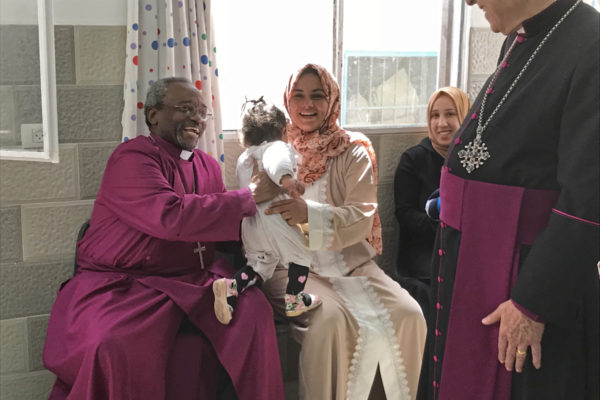Good Friday Offering raises record total to support Middle East ministriesPosted Oct 18, 2018 |
|

Presiding Bishop Michael Curry hands a toddler back to her mother while visiting a session for mothers and their young children at Al Ahli Arab Hospital in Gaza City during a pilgrimage to the Holy Land in March. Jerusalem Archbishop Suheil Dawani is at right. Photo: Mary Frances Schjonberg/Episcopal News Service
[Episcopal News Service] The Episcopal Church’s Good Friday Offering, an annual collection to support ministries in the Middle East, hit a fundraising milestone in 2017, topping $400,000 for the first time.
The offering has been a “remarkable success” in recent years, said the Rev. Robert Edmunds, the church’s Middle East partnership officer. More than 1,400 congregations, including those in overseas dioceses of the Episcopal Church, participated on Good Friday 2017. Contributions totaled $414,310 according to figures finalized recently after a church audit.
The Good Friday Offering supports a variety of programs in the Anglican Province of Jerusalem and the Middle East, such as conferences and summer camps for children in the Diocese of Jerusalem, women’s empowerment programs, an eye clinic and other medical ministries.
“This extraordinary outpouring of generosity allows for essential funding of humanitarian aid in hospitals like the Al Ahli Arab Hospital in Gaza and the Ras Morbat Eye Clinic in Yemen, in addition to other medical ministries, schools and programs for women and youth,” Edmunds said. “The Good Friday Offering continues a strong tradition of prayer, advocacy and meaningful financial support for valuable ministry among our sisters and brothers throughout the Middle East.”
The Good Friday Offering, an initiative of the presiding bishop’s office, dates to 1922, when it was created in the aftermath of World War I in an attempt to foster relationships with Christians in the Middle East by supporting relief work and ecumenical partnerships. Each year, the Episcopal Church provides the proceeds to dioceses in the region to distribute to their locally led ministries.
The amount collected by all Episcopal congregations on Good Friday had fallen to $266,000 in 2013, but it topped $350,000 in each of the three following years before setting a record in 2017.
“Through the years many Episcopalians have found the Good Friday Offering to be an effective way to express their support for the ministries of the four dioceses of the Province of Jerusalem and the Middle East,” the Episcopal Church says in an online summary.
Presiding Bishop Michael Curry embarked on a pilgrimage to the Holy Land leading up to Good Friday 2018. Among the stops on Curry’s Holy Week trip was the Al Ahli Arab Hospital, whose medical ministry in Gaza City receives money from the Good Friday Offering.
“The number of Christians in Gaza are decreasing dramatically, but the witness to the way of Jesus is as strong as ever because at Al Ahli Arab Hospital healing happens – Muslim, Christian, anyone who needs it, healing happens,” Curry told Episcopal News Service after visiting the hospital. “And that is the way of Jesus. That is what love looks like. That is what the sacrifice on the cross was about.”
The total collected from the 2018 Good Friday Offering has not yet been released.
The Episcopal Church’s United Thank Offering grant program and Episcopal Relief & Development also have provided advocacy, awareness and financial support through the years for the Province of Jerusalem and the Middle East.
The Episcopal Church’s General Convention regularly considers resolutions related to Middle East issues. Resolutions that take positions on the Israeli-Palestinian conflict typically generate the most debate, though the church has backed other measures as well, affirming financial support for peacemaking efforts and humanitarian ministries. A 2012 resolution specifically singled out the Al Ahli Hospital for support. And in July, the 79th General Convention passed a resolution in response to a humanitarian crisis in Yemen.
The resolution on Yemen concluded by asserting “that throughout the Middle East region access to water and sustainable agriculture are serious problems and a primary source of conflict,” and it pledged to undertake “relief and long-term economic development projects in areas such as education, job creation and health care, as well as sustainable solutions for the lack of access to water.”
– David Paulsen is an editor and reporter for the Episcopal News Service. He can be reached at dpaulsen@episcopalchurch.org.

Social Menu